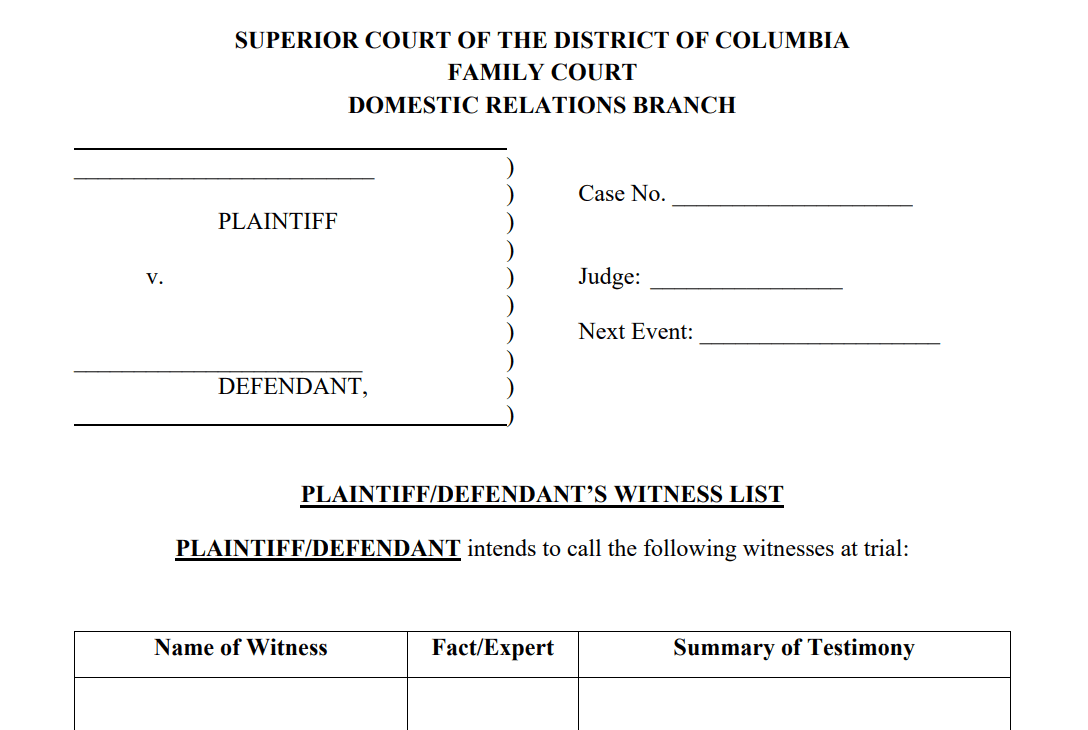Making a Witness List for Family Court: Custody Cases
Witnesses help support your case for custody. They take the stand during trial to provide their firsthand account of an event or to give an expert opinion. Strong witnesses are among the best evidence for a custody case.
A witness list explains who will testify on your behalf. In a custody case, parents themselves are witnesses. The other witnesses are selected by the parents and their attorneys. The witnesses you choose can make or break your custody case.
How to choose witnesses for custody cases
There are two types of witnesses: lay witnesses and expert witnesses.
Avoid witnesses who can only speak about what someone said; hearsay is not acceptable evidence. Instead, find those who can speak about things they've witnessed firsthand or taken the time to study (if they're an expert).
Lay witnesses
Lay witnesses (also called fact witnesses) are those who've directly witnessed something, e.g., a parent disparaging the child. Choose people who can back up a specific claim and remain calm on the stand. Being combative or badmouthing the other parent without ground — in court or on social media — can hurt the witness' credibility.
Lay witnesses who can provide valuable input include:
- Your child's caregivers: Caregivers include teachers (more below), coaches and nannies who can speak to your child's behavior, home life and more. If the caregiver is paid, keep in mind who pays them. If you're paying for their services alone, the judge may assume the witness is biased.
- Your child's friends' parents: The parents can testify about their interactions with you and the child, as well as your parental fitness if they trust you to care for their children.
- Neighbors: Neighbors can provide insight into the child's home life and interactions they've had with the family.
Family and romantic partners can serve as witnesses, but the court may not hold their testimony in high regard since they're likely to be biased. Getting a family member of the other parent to testify on your behalf could help your case.
Choose witnesses who can contribute valuable information. While the court may agree to hear from character witnesses, "he's a great parent," is less valuable testimony than "he's the only parent that buys clothes for the child." A witness can testify to your character in court or via a character reference letters.
In some states, the child can testify. This often happens privately (e.g., in a Lincoln Hearing in New York), though it is also possible for them to testify in open court.
Expert witnesses
Expert witnesses supply their knowledge to give weight to your arguments. They don't need to have a firsthand account or a relationship with either party or the child.
Common expert witnesses in custody cases include:
- Custody evaluators: If a custody evaluation was part of your case, you may call the evaluator as a witness to speak more about their findings.
- Child psychiatrists: A psychiatrist can speak about the child's behavior and how it might relate to parenting and what would best serve the child.
- Doctors: If the child's health is a factor in the case, a specialist doctor may testify to help the court understand the relevant medical conditions.
Some expert witnesses charge for their time. You'll want to be selective to save money.
Can teachers testify in custody cases?
Yes, teachers can testify in custody cases. This is a common question.
Teachers are good witnesses because they have a vested interest in your child's well-being. They frequently interact with the child, so they have valuable insight into the child's behavior and school performance, which may reflect home life.
Making a witness list
Your witness list explains who will testify on your behalf and briefly summarizes what they will talk about. Your court will set a deadline by which you must hand in your witness list. Ten days before trial begins is common.
Some courts have forms like the one below:

You'll need to create your own form if the court doesn't offer one. Use court forms you find online as models for your template.
Though some requirements vary by court, the basic format of a witness list is as follows:
- Include your name, address and the date of your custody trial.
- List the names of your children , along with their ages and current school grade. Some courts only require your children's initials.
- Write each witness' name and how they're related to you or the child. Include how long you expect their testimony to last and a brief description of what they will talk about.
You may need to include contact information for each witness as well.
List all possible witnesses to make sure they get a chance to testify. File your witness list with the court. Courts may refuse to hear from witnesses who are not disclosed by trial. You'll exchange witness lists with the other side during discovery.
Managing your child custody case
Witnesses are just one of the moving parts of a custody case. A parenting app helps you organize all these moving parts.
Throughout your case, you may need to create a parenting plan, draft multiple custody and visitation schedules, track your time with your child, calculate expenses and beyond.
The Custody X Change app enables you to do all of that in one place.
 You can customize this to fit your situation with Custody X Change.
You can customize this to fit your situation with Custody X Change.
With a parenting plan template, customizable custody calendars, an expense tracker and more, Custody X Change makes sure you're prepared for whatever arises in your journey to child custody.
Take advantage of our technology to keep your case organized.
